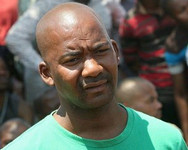
THE Workers and Socialist Party (Wasp), launched last week, is expected to register with the Independent Electoral Commission. The party is planning to contest next year’s elections, but building an organisation from scratch is always difficult.
At the same time, its mere formation may remind the political elites that there could be a growing group of people who find new messages exciting. In some respects, the National Union of Mineworkers’ dramatic loss of members could be an indication of a bigger process.
Wasp was formed out of the Marikana shootings, among a group of people who were part of the process leading up to that incident and subsequent events. The main public figure is Mametlwe Sebei, who denies being the “leader” and claims to be merely a spokesman.
He admits that members, and possibly leaders, of the Association of Mining and Construction Union (Amcu) are involved.
New political formations in recent times have found it hard going. Since 1994, the United Democratic Movement, the Independent Democrats and then the Congress of the People (COPE) have all claimed to be the “next big thing”, then failed spectacularly.
Instead, SA has been moving slowly towards a two-party system, with the African National Congress (ANC) and the Democratic Alliance (DA) taking the lion’s share of the vote.
However, it does now appear that there is a significant group of people who feel that they are not represented in organised, parliamentary politics. It seems the proportion of those who feel this way changes from province to province.
In Kwa-Zulu-Natal, where the ANC has grown strongly in recent years, voting figures in the 2011 local government elections indicate that 61.53% of registered voters cast ballots, but in Limpopo, North West and Mpumalanga that figure fell to 50.05%, 53.47% and 55.80%.
While municipal elections generally have a lower turnout than general elections, this is still an indicator that many people who were not allowed to vote until 1994 are still choosing not to.
As Wasp is centred in North West and surrounding areas, it appears that these provinces are where the party is most likely to pick up votes. But it will struggle to form a coherent organisation.
One of DA leader Helen Zille’s most pointed critiques of new political formations has been that many underestimate the time, effort and sheer resources it takes to create and run regional, provincial and national structures.
This was demonstrated by COPE, which won more than 1-million votes in 2009 but was unable to transform its electoral viability into a proper, sustainable, political structure.
Mamphela Ramphele’s new organisation, Agang, may be about to ram the point home as she does not seem to have created structures to take the party forward.
However, COPE’s 2009 performance, combined with public apathy over organised parliamentary politics, appear to indicate that there is a hunger for a new message.
Considering that those hungriest for that message are likely to be poor and unemployed, this could be fertile ground for a party with a radical agenda — which is a bill that Wasp could fill.
As Amcu’s rise among mineworkers has shown, there may be a desire for more radical policies, including redistribution of wealth.
Picture Caption: Mametlwe Sebei.
Picture Source: SOWETAN
Article by: Stephen Grootes
Stephen Grootes, a Rhodes Alumna, is an Eyewitness News Reporter.
Source: Business Day
